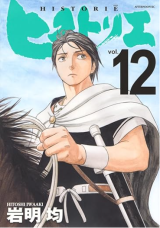I'm usually not stuck up on historical accuracy, in fact I usually prefer historical novels that make it clear from the start whether they're realistic or not, because then I can focus on the story-telling and not the nagging question of "did this really happen?" Still, I'm not against embellishment for the sake of a good story. The problem here starts with the writing.
The main character is incredibly bland: the few moments of strong emotions he has are over in like 3 panels, then it's like it never happened before. It doesn't feel like there's depth or continuity to his character apart from being good at everything he tries. And he is indeed good at just about everything: an instinctively strong fighter, someone with great knowledge, a master orator and actor too, inventor and craftsman. It could have been fine, I love smart well-rounded characters, except much of it was very poorly developed. His initial fighting prowess, for example, is based on something as flimsy as a single childhood memory (there's a limit to suspension of disbelief).
Worse, he gathers admiration and respect from whomever just glances at him for a while, which eventually starts to feel ridiculous. He is also so lucky that in the end, I went to check out his historical background, to see if the problem was just me not accepting real historical events. It turns out that Eumenes was never the son of some Scythian warrior, but the son of a poor Thracian wagoner, and didn't appear to have ever been a slave. Instead of working with existing historical events, and making the character compelling through great writing and dialogue, the author basically chose to embellish his background instead, except it resulted in forced and unbelievable writing.
From this point onwards, the historical issues became more jarring (for me):
- Hephaestion is Alexander's double-personality. What?
- Aristotle performed CPR (18th century). Aristotle is plenty interesting by himself, -why- did the author feel the need to hype him with CPR?
- The author chose to hype Eumenes by making him invent a variant of chess. Chess was invented around 600 AD, not BC. (the ancient Greeks played checkers. Not the same thing)
Herein lies a problem with the writing: instead of using or embellishing existing events of that time period (which I would be fine with), the author patches in 'cool' discoveries from other time periods or invents extravagant backgrounds to hype the characters. To me, this was really distracting in a bad way.
Now, apart from that, historical manga can also be very interesting when they immerse you into an era and offer lots of interesting facts about the era. Sadly Historie is pretty superficial on this aspect. It mentions a lot but never goes in-depth into any particular aspects: customs, religion, food, economy, education, technology and craftsmanship, inner politics, military etc. It feels like the author is throwing in trivia from a textbook instead of allowing the reader to truly explore and immerse within that time period. Worse, the characters often feel like modern people wearing greek clothes. Change their names and clothes, and they could be in any time period, really. An example that irked me early on for example was Eumenes commenting that Balsin seemed too young to be married, yet I was taught that back then, girls were married very young to ensure their virginity (like, starting from age 14), whereas men were married much later (because of military service). This is just an example.
Basically, I found Historie to be a pretty poor 'historical' manga (unbelievable inaccuracies, nothing about the era gets truly explored in-depth and just serves as fodder for story progression), and not that good as a fictional story either (forced events, bland Gary Stu main character etc.). Still, it could turn for the better as it heads into better documented periods and events.





